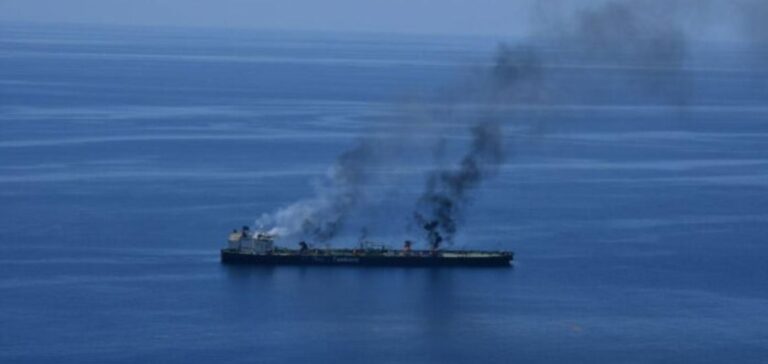On August 23, 2024, the Greek tanker Sounion, carrying 150,000 tons of crude oil, was severely damaged by an attack by Houthi rebels off Hodeida, a strategic port in Yemen.
Using drones and missiles, the Houthis set fire to the vessel, forcing the emergency evacuation of the crew and leaving the ship adrift.
This incident marks a new stage in the escalation of attacks targeting critical shipping routes in the Red Sea, a key corridor for global hydrocarbon trade between Europe, the Middle East and Asia.
International maritime authorities, including the European Union through the Aspides mission, have expressed serious concerns about the impact of this incident on shipping safety.
The Sounion, now out of control, represents a major obstacle to other vessels transiting the region, increasing the risk of disruption to the global flow of trade.
Escalating tensions and worrying precedents
This is not the first time the Houthis have targeted oil tankers in this strategic area. Since October 2023, they have stepped up their attacks, striking more than 80 ships in the Red Sea.
In March 2024, the Belize-flagged oil tanker Rubymar sank after being attacked by the Houthis, resulting in the loss of 21,000 tons of chemicals, an attack that marked an escalation of hostilities against commercial vessels.
In the same month, the Chinese oil tanker Huang Pu was also targeted by Houthi missiles.
Although this attack did not cause a major spill, it demonstrated the Houthis’ ability to severely disrupt maritime traffic in this region crucial to global trade.
These successive incidents highlight the growing risks to maritime infrastructure, exacerbated by the logistical and military support the Houthis receive from Iran.
Implications for global energy security
The repercussions of these attacks are far-reaching.
The Red Sea is a vital artery for the transport of hydrocarbons, linking Middle Eastern producers to world markets.
The persistent threat of Houthi attacks is prompting several shipping companies to divert their vessels via the Cape of Good Hope, lengthening journeys and increasing logistical costs. This threatens to drive up oil prices and disrupt energy supplies, with potentially global consequences.
In response to these growing threats, the international community, notably the United States and the European Union, has stepped up patrols and military operations in the region.
However, despite these efforts, attacks continue, illustrating the vulnerability of maritime routes to military action in conflict zones.
This complex situation calls for a coordinated international response to secure global energy flows and protect critical infrastructure.






















